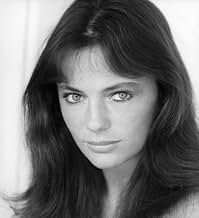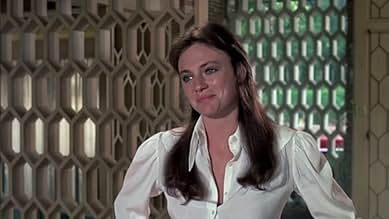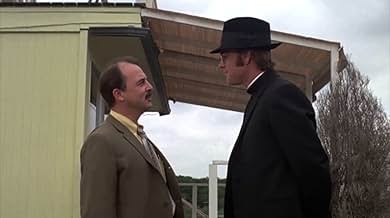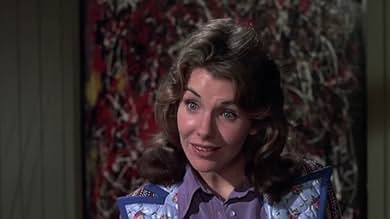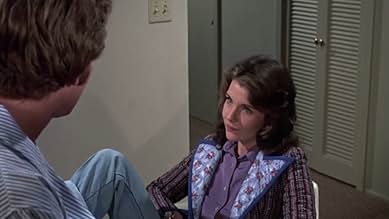CALIFICACIÓN DE IMDb
6.1/10
1.3 k
TU CALIFICACIÓN
Un programador informático decide convertirse en ladrón. Y cuando empieza a hacer ruido, un investigador de seguros lo acosa. También conoce a una mujer que se convierte en su cómplice.Un programador informático decide convertirse en ladrón. Y cuando empieza a hacer ruido, un investigador de seguros lo acosa. También conoce a una mujer que se convierte en su cómplice.Un programador informático decide convertirse en ladrón. Y cuando empieza a hacer ruido, un investigador de seguros lo acosa. También conoce a una mujer que se convierte en su cómplice.
- Dirección
- Guionistas
- Elenco
Ollie Ree Alridge
- Maid
- (sin créditos)
Jim Antonio
- Poker Player
- (sin créditos)
Army Archerd
- Newsman
- (sin créditos)
- Dirección
- Guionistas
- Todo el elenco y el equipo
- Producción, taquilla y más en IMDbPro
Opiniones destacadas
I have loved this movies for years and wish it were on DVD. Ryan O'Neal gives his career best performance as the amateur thief who decides that this way of life is more exciting than what he did before. The Houston location is interesting and the capers themselves are hair-raising. The addition of the chess motif and the relationship between Warren Oates and O'Neal was almost touching. The ending makes you see how much the O'Neal character liked the detective played by Oates.The film also contains one of my favorite lines of dialog as well. When Bissett asks O'Neal what it is like to rob a house, he answers :" It's like a heart attack with a lot of fear thrown in"
Look, this is 2010 or later. You've checked out Serpico, Mean Streets, The Godfather---all the obvious choices. But I just watched The Thief Who Came to Dinner last night, and it made me realize that there's probably a lot I've been missing. A lot of terrific movies that were maybe ignored or under-estimated when they first came out (for some reason or another) that are actually pretty great.
Let me put it to you this way. if you're a guy (or a gal) with a sort of boring job, who's occasionally fantasized about chucking it all and just becoming a professional jewel thief---this is the movie you want to live in. Ryan O'Neal is handsome and charming, Jacqueline Bisset is beautiful, and Warren Oates is very Warren Oates-y. The story(by Walter hill, based on a novel) works, and you won't be left hanging by some typical early 70's drag ending (thank God)---I don't know what else to say. The Thief Who came to Dinner is a really good time. It should have made $100 million dollars in 1973. It's a tragedy (possible slight overstatement) that it didn't.
Let me put it to you this way. if you're a guy (or a gal) with a sort of boring job, who's occasionally fantasized about chucking it all and just becoming a professional jewel thief---this is the movie you want to live in. Ryan O'Neal is handsome and charming, Jacqueline Bisset is beautiful, and Warren Oates is very Warren Oates-y. The story(by Walter hill, based on a novel) works, and you won't be left hanging by some typical early 70's drag ending (thank God)---I don't know what else to say. The Thief Who came to Dinner is a really good time. It should have made $100 million dollars in 1973. It's a tragedy (possible slight overstatement) that it didn't.
Considering that its been close to forgotten, TTWCTD was a pleasant and substantial surprise when I watched it a few years ago.
This is far from a perfect film as it has several flaws. While the caper scenes involving central character Webster McGee's (Ryan O'Neal) are entertaining enough they're hardly groundbreaking and have been done better in other films. And as another reviewer said, the film probably could've done without the segment involving the arrogant chess expert Zukovsky (played by Austin Pendelton). While not without humour, in the context of the rest of the film it's played too broadly by Pendelton and doesn't really fit in.
But there is much of interest in this film that make it well worth catching up with. The central romance between O'Neal and wealthy socialite Jackie (who gives him his chance to move into the upper echelons of society) played by Jacqueline Bisset isn't really that convincing, perhaps deliberately so. McGee's attraction to the vacuous and cold Laura only makes sense in the context of Jill Clayburgh's performance as McGee's ex-wife Jackie. In her brief on-screen time, Jackie comes across as a far more likable persona then the cold and chilly Laura (doubtless this is also because Bisset has always come across as a cold and unlikable personality for mine). But we can see in Jackie's one scene with Webster that she has tics and neuroses that remind Webster of his past and he has moved on with someone far more frivolous and insubstantial.
But the really fascinating part of the film is the relationship between McGee and the insurance investigator Dave Riley. If this film were made today, Riley would most likely be portrayed as a harried, bumbling 'loser' with McGee (and the filmmakers) regularly mocking his failure to catch him at every turn.
But TTWCTD does something highly unusual and daring. It has McGee display immense sympathy and empathy for Riley even as he's doing his best to catch him. Why? Because he knows that he was just like him previously - someone stuck in a dead-end job trying to do their best but feeling immensely dissatisfied about their life and feeling helpless to do anything about it.
It's this relationship which is the real strength of the film, helped especially by Oates' marvellous performance as Riley and helps it stay in the memory long after one has finished watching it.
And while it has its detractors, I also found Henry Mancini's music score very pleasing on the ear.
This is far from a perfect film as it has several flaws. While the caper scenes involving central character Webster McGee's (Ryan O'Neal) are entertaining enough they're hardly groundbreaking and have been done better in other films. And as another reviewer said, the film probably could've done without the segment involving the arrogant chess expert Zukovsky (played by Austin Pendelton). While not without humour, in the context of the rest of the film it's played too broadly by Pendelton and doesn't really fit in.
But there is much of interest in this film that make it well worth catching up with. The central romance between O'Neal and wealthy socialite Jackie (who gives him his chance to move into the upper echelons of society) played by Jacqueline Bisset isn't really that convincing, perhaps deliberately so. McGee's attraction to the vacuous and cold Laura only makes sense in the context of Jill Clayburgh's performance as McGee's ex-wife Jackie. In her brief on-screen time, Jackie comes across as a far more likable persona then the cold and chilly Laura (doubtless this is also because Bisset has always come across as a cold and unlikable personality for mine). But we can see in Jackie's one scene with Webster that she has tics and neuroses that remind Webster of his past and he has moved on with someone far more frivolous and insubstantial.
But the really fascinating part of the film is the relationship between McGee and the insurance investigator Dave Riley. If this film were made today, Riley would most likely be portrayed as a harried, bumbling 'loser' with McGee (and the filmmakers) regularly mocking his failure to catch him at every turn.
But TTWCTD does something highly unusual and daring. It has McGee display immense sympathy and empathy for Riley even as he's doing his best to catch him. Why? Because he knows that he was just like him previously - someone stuck in a dead-end job trying to do their best but feeling immensely dissatisfied about their life and feeling helpless to do anything about it.
It's this relationship which is the real strength of the film, helped especially by Oates' marvellous performance as Riley and helps it stay in the memory long after one has finished watching it.
And while it has its detractors, I also found Henry Mancini's music score very pleasing on the ear.
Ryan O'Neal gives one of his better, looser performances in this crime-caper, a handsome comedy-drama involving a computer programmer-turned-jewel thief planning a major heist. Warren Oates is the insurance investigator in dogged pursuit, Jacqueline Bisset (at her most lovely) plays a love-interest in on the action, Austin Pendleton is very funny as a nerdy chess pro, and wonderfully blithe Jill Clayburgh makes a big impression in the minor role of O'Neal's ex-wife. Brisk, fairly engaging fluff has tongue wryly in-cheek and is well-directed by Bud Yorkin. This seemed a little flat when it played in theaters, but it works much better on the tube. **1/2 from ****
I've seen this film twice, and I like it quite a bit. It's possibly the best performance O'Neal has given, Oates does a nice turn, and it has Jackie Bisset. The plot is okay, but the performances really give this film its punch. "Thief..." may not be for everyone, but it's worth a shot. The film may seem a bit dated and slow, so viewer beware.
¿Sabías que…?
- TriviaThe opening scene where where Webster quits his job and drives away is actually set at the Houston Space Center, NASA.
- ErroresTravis is pulled over by police and is asked for the car's registration. In the 1970s, Texas did not require that the registration be kept in the car, and officers did not ask for it. Hollywood got it wrong because in California drivers were required to present their "registration".
- ConexionesFeatured in Gazap Rüzgari (1983)
Selecciones populares
Inicia sesión para calificar y agrega a la lista de videos para obtener recomendaciones personalizadas
- How long is The Thief Who Came to Dinner?Con tecnología de Alexa
Detalles
Taquilla
- Total en EE. UU. y Canadá
- USD 679,839
Contribuir a esta página
Sugiere una edición o agrega el contenido que falta

Principales brechas de datos
By what name was The Thief Who Came to Dinner (1973) officially released in India in English?
Responda
